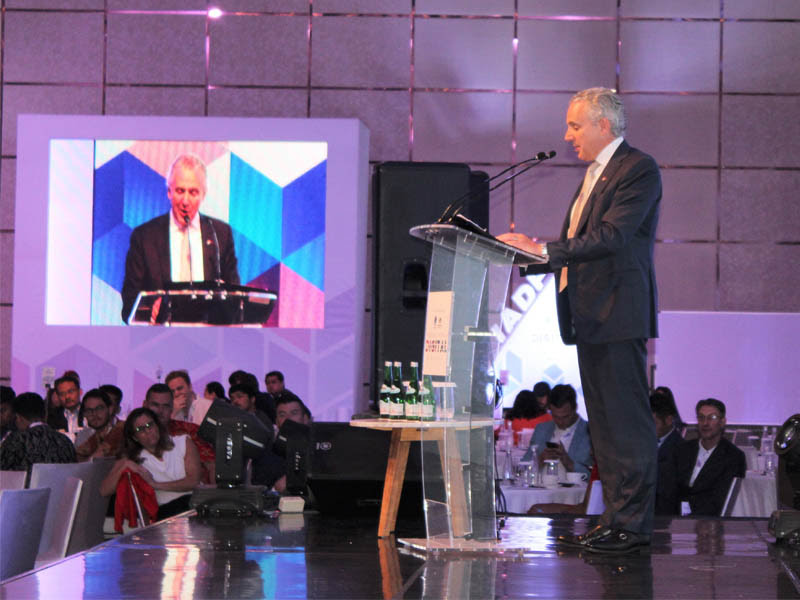Telstra chief executive Andy Penn has nominated the development of next-generation skills and capabilities as the key ingredient for capitalising on the current wave of disruptive technological change.
Speaking on the sidelines of Indonesia-Australia Digital Forum in Jakarta last week, Mr Penn told InnovationAus.com there is no guarantee of success for any company – or any country – but getting the setting right on skills is crucial.
We are entering a new industrial revolution where everything that can be connected will be connected and automated, he says.

The challenges and opportunities of this revolution are as profound as anything the world has seen before, from the introduction of the steam engine, or electricity, to the arrival of computers.
The changes will have a deep impact on the nature of work and the roles within the workforce – necessarily making skills the critical focus – for policy-makers and CEOs.
“History has shown over many industrial revolutions that – generally speaking – society overall has been the better for it,” Mr Penn said.
“But what sectors of society, and what countries and companies are successful … is really determined by the policy decisions you make and the strategic decisions you make.
“I’m really confident that over the next period of digital transformation the world will be – and society will be – [better off. But] it’s not a guarantee.
“Having a set of policies and strategic settings that ensure that we are building the skills and capabilities to be successful in the new world is crucially important.”
Without commenting specifically on current government policy – where there has been a tightening of regulations around importing temporary skills – Mr Penn says “accessing global talent is really going to be an issue,” just as the free-flow of talent is important.
He also touches on the bilateral Indonesia-Australia trade relationship, and Telstra’s own expansion plans for the market (including his hopes for the looming Indonesia-Australia Comprehensive Economic Partnership Agreement.)
On the broad spectrum of government tech policy, Mr Penn says simply that “it’s important that we maintain the momentum behind the innovation agenda” and that “this government has shown a commitment to do that.”
In Asia, Mr Penn says it is a fair observer that Telstra’s interest in the region has ebbed and flowed. But if a resurgence of activity in recent years is evidence, the pendulum has swung back to flow.
He says Telstra’s Asia strategy is very clear and is based on its very substantial existing asset – its submarine cable network – on the one hand, and building out its application and service layer on the other.
The cable business continues to be an investment focus, while the company has become much more active in the region as a technology investor through its Telstra Ventures and Muru-D operations.
“We basically operate about one-third of all cable activity across the region – which in other words means we carry about one-third of all traffic – and data volumes in Asia increased by about 70 per cent last year,” Mr Penn said.
“That’s completely understandable. Technology innovation is driving a lot of demand for connectivity. And in Asia where a young population is becoming more digitally savvy, it is growing faster than anywhere else in the world.”
“So, our strategy is firmly centred around that core capability, and then building on top of that the applications and services that actually enable our customers to bring that to life for their businesses.”
In addition to its US operation, Telstra Venture is now in China and Singapore. It has also stepped up venture co-operation with existing partners in the region. For example, Telstra Venture has made a couple of co-investments in tech companies with the venture arm of Telekom, its Indonesian partner in the Telekom-Telstra joint venture.
Telstra has also taken graduates from the Telekom accelerator in Jakarta and put them through the Muru-D accelerator in Singapore.
Meanwhile, Mr Penn told the Indonesia-Australia Digital Forum that Telstra’s aim “to become a world class technology company” that has empowered people to connect is a reason the company has increased its level of investment in the business by up to $3 billion over the next three years.
“We are investing because the traditional worlds of telecommunications and computing are converging,” Mr Penn told the forum.
“There is no tech innovation today that is not intended to be connected – from drones to driverless cars, cloud computing to online banking, ecommerce to the Internet of Things.
“All these applications and services have one thing in common – they rely on a high quality, fast, reliable and secure telecommunications network. Telstra has world class skills in network and electrical engineering, and we have the best networks.
“We are also building new skills in new areas – in software engineering, in data science, in artificial intelligence and ultimately in quantum computing.”
InnovationAus.com traveled to Jakarta at our own expense to cover the Indonesia-Australia Digital Forum.
Do you know more? Contact James Riley via Email.

